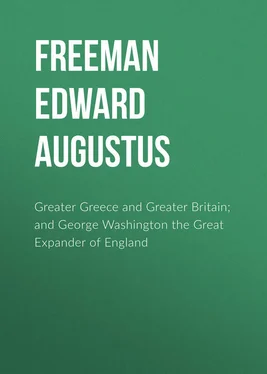Edward Freeman - Greater Greece and Greater Britain; and George Washington the Great Expander of England
Здесь есть возможность читать онлайн «Edward Freeman - Greater Greece and Greater Britain; and George Washington the Great Expander of England» — ознакомительный отрывок электронной книги совершенно бесплатно, а после прочтения отрывка купить полную версию. В некоторых случаях можно слушать аудио, скачать через торрент в формате fb2 и присутствует краткое содержание. Жанр: foreign_antique, foreign_prose, на английском языке. Описание произведения, (предисловие) а так же отзывы посетителей доступны на портале библиотеки ЛибКат.
- Название:Greater Greece and Greater Britain; and George Washington the Great Expander of England
- Автор:
- Жанр:
- Год:неизвестен
- ISBN:нет данных
- Рейтинг книги:4 / 5. Голосов: 1
-
Избранное:Добавить в избранное
- Отзывы:
-
Ваша оценка:
- 80
- 1
- 2
- 3
- 4
- 5
Greater Greece and Greater Britain; and George Washington the Great Expander of England: краткое содержание, описание и аннотация
Предлагаем к чтению аннотацию, описание, краткое содержание или предисловие (зависит от того, что написал сам автор книги «Greater Greece and Greater Britain; and George Washington the Great Expander of England»). Если вы не нашли необходимую информацию о книге — напишите в комментариях, мы постараемся отыскать её.
Greater Greece and Greater Britain; and George Washington the Great Expander of England — читать онлайн ознакомительный отрывок
Ниже представлен текст книги, разбитый по страницам. Система сохранения места последней прочитанной страницы, позволяет с удобством читать онлайн бесплатно книгу «Greater Greece and Greater Britain; and George Washington the Great Expander of England», без необходимости каждый раз заново искать на чём Вы остановились. Поставьте закладку, и сможете в любой момент перейти на страницу, на которой закончили чтение.
Интервал:
Закладка:
When then we compare the colonial system of modern times, like any other feature of modern political life, with the thing answering to it in the political life of the old Greek city-commonwealths, we must never forget the difference of area on which the political life of the two periods has been acted; but we must never allow ourselves to fancy that difference of area, any more than distance of time, wholly shuts us off from political fellowship with those earlier times or makes their experience of none effect for our political instruction. The communities of those days were cities, the communities of our days are nations; but cities and nations alike share in a common political life in which many of the ages that went between their days and ours had no share. The Greek settlements, like the Phœnician settlements before them, were settlements of cities, not of nations, not of kingdoms or of commonwealths on the scale of kingdoms. Till the political needs of a later age taught the Greek that several cities might be combined in a federal union, his whole political life had gathered round the single independent city as its essential unit. Every Greek city was not independent; but every Greek city deemed itself wronged if it was not independent; when its independence was lost, it was, within all Hellenic lands, lost by the rule of city over city. And the rule of city over city, if it took away the independence of the subject city as an equal power among other powers, did not wipe out its essential character as a separate city-commonwealth. The dependent city was not incorporated like an annexed land; it was not held in bondage like a subject province; it remained a city, with more or less of freedom in its local affairs, though bound, as against other powers, to follow the lead of the ruling city. The city was all in all; the smallness of the community, the narrowness of its area, brought every citizen face to face with his fellows and his leaders; it brought with it a fulness of political life, an extension of political power and political interests to every citizen, to which larger states have reached only by painful steps and by help of the inventions which have in some sort made time and distance cease to be. The Greek was before all things a citizen; his political life was wholly local; his powers and duties as a citizen could be discharged only in his own city, on some spot hallowed by old tradition, and hallowed most commonly in the more formal sense by the abiding presence and guardianship of the patron deity. He felt in the strongest sense the tie of membership of a community, the tie of all the duties which spring from membership of a community. For his city he would live and toil and die, but he would live and toil and die for it, because it was the whole of which he was himself a part. He owed faith and loyalty to his city – loyalty in its true and ancient sense of obeying the law, the law which he might be called on to help to administer, which he might, in some rare case, be called on to help to change. He might keep that faith and loyalty far away from his own city by doing all that he could in foreign lands for the interest and honour of that city. But in no other sense could he carry his citizenship with him beyond the bounds of the territory of his city; elsewhere he might act as a soldier or as an envoy, but hardly in the strictest sense as a citizen. The tie was local; the duty was local; of a personal tie of allegiance binding him to a personal superior, bringing with it personal duties which should everywhere dog his steps, which could not be cast off in any corner of the world – of loyalty in that sense, the old Greek, the old Phœnician, had never any thought in his mind.
The change in the meaning of the word “loyalty” well marks that leading political characteristic of modern Europe which stands out in the fullest contrast to the political thoughts of the ancient commonwealths. Loyalty, once simply legalitas , obedience to the law, has for ages meant – when it has not meant something far baser – no longer obedience to the law, no longer duty to a community as a community, but faith and duty owed by one man to another man. It may be simply the personal duty of a man to his lord, the tie of chosen or hereditary comradeship, the tie known by the oldest Greek and by the oldest German, an ennobling tie indeed as regards the man himself, a tie which may lead to lofty prowess or to pure self-sacrifice, the tie of the true companions of Brihtnoth on the day of Maldon, when on the place of slaughter each man lay thegn-like, his lord hard by. Or it may take the less poetic, the more political shape, in which the thought of the commonwealth does come in, but where the commonwealth is perhaps overshadowed by its chief, perhaps only embodied in him. The notion of personal allegiance, a notion which could have been hardly understood by either the aristocratic or the democratic Greek, has been the essence of the political system of Europe for many ages. It is a notion which grows up as naturally in a kingdom as the other notion, the notion of duty to the community, grows up in a commonwealth which knows no abiding personal head. It by no means shuts out the notion of duty to the community; but, as has been just now implied, it has a tendency to overshadow it. In the higher types of the class, in the French nobles, for instance, under the old monarchy, the feeling of personal loyalty, of devotion to the particular man who wore the crown, perhaps reached its highest point since the days of the old Greek and Teutonic comradeship. It was a feeling that was by no means wholly degrading; but it tended to put in the shade, if not wholly to crush out, feelings higher and worthier. Men looked so much to the King of France, they looked so much on France as embodied in his person, that there was small room left in their thoughts for France herself, for France as embodied in her people. Since kingdoms have put on more nearly the practical shape of commonwealths, this extravagant devotion to a single man has been somewhat toned down, and more room is gained for feelings coming nearer to those which were felt in a free democracy of old. But the radical distinction still remains between the leading political ideas of the state which acknowledges a prince as its sovereign and the state which knows no sovereign but the commonwealth itself. The primary and formal duty of the member of a state that acknowledges a prince, a duty to which in many cases he is bound by direct personal promises, is a personal duty to a person. It is a duty which he cannot throw off under any circumstances of time and place; it follows him wherever he goes; on the most distant foreign soil he remains the subject of the prince in whose dominions he drew his breath. While the active duties of the citizen of a commonwealth can hardly be discharged beyond the territories of that commonwealth, the duties of the subject of a king, the subject, that is, of a personal master, are as binding on one part of the earth’s surface as on another. I have just used words which go to the root of the matter. I have used the words “citizen” and “subject.” The difference between the two conceptions can nowhere put on a more living shape than in the use of those two names. The Greek would have deemed himself degraded by the name of “subject.” To him the word that best translates it expressed the position of men who, either in their own persons or in the person of the cities to which they belonged, were shorn of the common rights of every city, of every citizen. We use the word “subject” daily without any feeling of being lowered by it. It has become so familiar that it is assumed as the natural phrase to express membership of a political body, and it is often used when it is quite out of place. I once read, and that in a formal document, of a “Swiss subject,” and I had the pleasure of explaining that there had been no subjects, no Unterthanen , in Switzerland since 1798 1 1 While I am revising my proofs, I read, in a law report in an English newspaper, something about “an American subject.”
. And the question comes, What are we to say instead? “Swiss citizen,” “French citizen,” “citizen of the United States,” have this awkwardness about them that the community whose membership they express is not a city. The very awkwardness points to the main difference between the world of old Hellas and the world of modern Europe, the difference in scale. Be it kingdom or be it commonwealth, the state with which modern politics have to deal is not a city but something vastly greater.
Интервал:
Закладка:
Похожие книги на «Greater Greece and Greater Britain; and George Washington the Great Expander of England»
Представляем Вашему вниманию похожие книги на «Greater Greece and Greater Britain; and George Washington the Great Expander of England» списком для выбора. Мы отобрали схожую по названию и смыслу литературу в надежде предоставить читателям больше вариантов отыскать новые, интересные, ещё непрочитанные произведения.
Обсуждение, отзывы о книге «Greater Greece and Greater Britain; and George Washington the Great Expander of England» и просто собственные мнения читателей. Оставьте ваши комментарии, напишите, что Вы думаете о произведении, его смысле или главных героях. Укажите что конкретно понравилось, а что нет, и почему Вы так считаете.












